How did the UK end up in such a mess over high-speed rail megaproject HS2?
09 October 2023
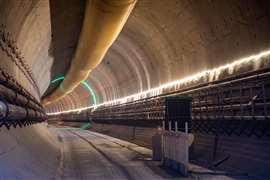 HS2’s under construction Chiltern tunnel. Photo: HS2
HS2’s under construction Chiltern tunnel. Photo: HS2
The signs hadn’t been good for some time. After weeks of speculation that the UK’s Prime Minister Rishi Sunak was preparing to cancel a significant portion of the HS2 high-speed railway, the official announcement finally came last week.
The project was already well over budget and behind schedule. Its original price tag, based on 2009 prices, was supposed to be £37.5 billion. But by 2020, a review of the project by civil engineer Sir Douglas Oakervee, estimated that it could cost as much as £106.6 billion.
As of June this year, the total amount of money spent on HS2’s first phase, which runs from London to Birmingham was £22.5 billion, out of a total spent of £24.7 billion.
That meant that the prospects for the rest of the line, running north of Birmingham to Crewe and Manchester were already in trouble.
Amid concerns about rising costs, the Transport Secretary Mark Harper announced in March this year that HS2 north of Birmingham would be “rephased”.
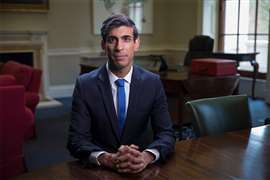 Rishi Sunak (Photo: Gov.uk)
Rishi Sunak (Photo: Gov.uk)
He also paused work on the stretch running from Old Oak Common, a new ‘super-hub’ station on the western outskirts of London, to the central London terminus of Euston. Costs for Euston station, which had already been redesigned and cut down to 10 platforms from the originally intended 11, had ballooned to £4.8 billion, nearly double the original £2.6 billion budget.
Announcing the scrapping of HS2 from Birmingham to Crewe and Manchester (Phases 2a and 2b) as well as the eastern leg to East Midlands Parkway (a proposed extension of that line to Leeds had already been scrapped), Sunak declared that “the facts have changed” and argued that there was a “false consensus” that links between big cities were “all that matters”.
He did confirm that the line from Birmingham (due for completion between 2029 and 2033) would run all the way into Euston and not terminate at Old Oak Common, as had previously been rumoured. However, that plan is dependent on securing private investment, with the government saying it would take lessons from the redevelopment of Battersea Power Station and King’s Cross Station.
The Euston project will also be placed under new management, separate from HS2 Ltd, which has been running the megaproject up to this point. Sunak claimed that there had to be “accountability…for the mismanagement of this project”.
Justification and cancelled contracts
Sunak already had ammunition when it came to justifying his decision.
In July, the Infrastructure and Projects Authority (IPA) gave a “red” rating to both Phase 1 and Phase 2a, indicating that it considered these segments “unachievable”.
Phase 2b (Crewe to Manchester) received an “amber” rating, indicating existing “significant issues”.
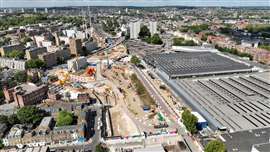 Aerial view of HS2’s London Euston construction site (Image: HS2)
Aerial view of HS2’s London Euston construction site (Image: HS2)
Following Sunak’s decision to cut out the second phase of HS2, the government said that every £1 spent on HS2 was supposed to deliver £2.30 worth of benefits back to the taxpayer. But despite revising the scope, those benefits could fall to as low as £0.80 in every £1 spent, it claimed.
Further justifying its decision, it added: “The original benefits-cost ratio for HS2 was underpinned by assumptions which are no longer valid.
“Covid-19 has completely changed travel patterns and business rail travel is currently around half of 2019 levels while the majority of public transport journeys continue to be taken by bus – at three billion a year.”
But cancelling contracts already awarded to construction companies for the later phases of the project are likely to cost hundreds of millions of pounds, Transport Secretary Mark Harper has conceded.
Contractors including Balfour Beatty and Kier had been awarded early works contracts on Phase 2a. Meanwhile, Aecom had won a deal to act as ‘ground investigation partner’ for the second phase, and other firms had won deals for geotechnical, hydrogeological and geo-environmental data.
Opposition
Sunak’s decision to lop off a significant part of the high-speed railway has attracted significant criticism from politicians of all stripes, as well as from within the construction industry.
In a rare intervention, former Prime Minister David Cameron said the decision was “the wrong one” and added “in years to come, I suspect many will look back at today’s announcement and wonder how this once-in-a-generation opportunity was lost”.
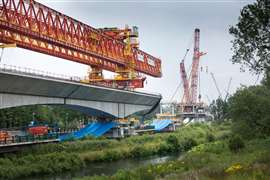 Progress being made on the Colne Valley Viaduct - the UK’s longest rail bridge - in August 2023. (Image: HS2)
Progress being made on the Colne Valley Viaduct - the UK’s longest rail bridge - in August 2023. (Image: HS2)
Meanwhile, Greater Manchester mayor Andy Burnham, who represents opposition party Labour, said that running HS2 from Birmingham to London and then switching it onto the already congested West Coast Mainline up to Manchester “does not make sense”.
Director of policy at the Institution of Civil Engineers (ICE), Chris Richards said the decision was a wake-up call for the UK to change how it approaches planning and delivering infrastructure.
“The stop-start approach the country takes to major infrastructure benefits no one. We need long-term plans, supported by evidence, long-term thinking on financing options, and robust and consistent policy to achieve desired outcomes,” he said.
Meanwhile Stu McInroy, chief executive of the Construction Plant-hire Association (CPA) called the news of the cancelled Manchester line, “a significant blow to the UK construction sector.”
He added that, “This decision shall undoubtedly further undermine confidence and impact future investment at a time when the economy remains fragile.”
What happens now?
Sunak has claimed that “every penny” saved from curtailing HS2 – an estimated £36 billion – will be reinvested into hundreds of new transport projects across the rest of the country.
“Every region outside of London will receive the same or more government investment than they would have done under HS2, with quicker results,” he declared.
The money will be reallocated under a new scheme unveiled by the government last week called ‘Network North’.
Network North promises to reinvest £19.8 billion in the north of England, including:
- £2 billion for a new station at Bradford and a new connection to Manchester;
- £2.5 billion to deliver a new mass transit system in West Yorkshire;
- £3 billion for upgraded and electrified lines between Manchester and Sheffield, Sheffield and Leeds, Sheffield and Hull, and Hull-Leeds.
- Nearly £4 billion more funding for local transport in the North’s six city regions.
- A new £2.5 billion fund for local transport across all areas in the North outside the six city regions – smaller cities, counties, towns and countryside.
- A new £3.3 billion fund for road resurfacing.
It also pledged a further £12 billion to connect Manchester to Liverpool, £9.6 billion for the Midlands (including £1.75 billion for a Midlands Rail Hub and extra funding for local transport and road schemes), and £6.5 billion for the rest of the country.
But the ICE’s Chris Richards cautioned that some of the schemes the government pledged to support with reallocated cash weren’t new.
He said, “The Prime Minister outlined several projects and schemes in his speech. Many of these projects aren’t new, and many have been previously caught in this stop/start cycle of decision-making, which drives up costs. This is likely to happen again.”
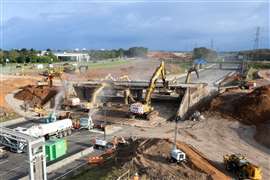 HS2 removes 4,000 tonne two-span bridge over M42 - 14 hours ahead of schedule. (PHOTO: HS2)
HS2 removes 4,000 tonne two-span bridge over M42 - 14 hours ahead of schedule. (PHOTO: HS2)
“Changing direction and switching projects delays businesses and communities from benefitting from infrastructure investment. These positive outcomes are how we should be measuring success, not just by lowest cost to deliver.
“The National Infrastructure Commission will publish its second National Infrastructure Assessment in a few weeks. Before politicians rush off to make the same mistakes again on infrastructure, they should pause, look at the commission’s advice and use this as a long-term plan to prioritise investment and rebuild credibility.”
And Paul Hamer, chief executive of major UK contractor Sir Robert McAlpine called for more detail and more long-term commitment to projects. He said. “We need a detailed, long-term plan and robust commitment on those proposed alternative infrastructure investments to move forward and stimulate economic and social growth for the country.”
‘Salting the earth’?
In the meantime, there have been suggestions from Sunak’s political opponents that he is trying to ensure that the later phases of HS2 can never be revived by selling properties along the route that had been bought up under compulsory purchase orders.
In a prospectus for Network North, the Department for Transport said the land acquisition programme on Phase 2a, which has so far cost £219.3 million, would be “halted immediately”.
It added, “Any property that is no longer required for HS2 will be sold and a programme is being developed to do this.”
Steve Rotheram, the Labour mayor of the Liverpool city region, said the move killed HS2 “stone dead”.
Meanwhile, the same document indicated that Euston station will be “stripped back”.
It said, “We will not provide a tunnel between Euston and Euston Square underground station or design features we do not need.
“Instead, we will deliver a 6-platform station which can accommodate the trains we will run to Birmingham and onwards.”
It is also establishing a development corporation to create a “Euston Quarter” offering up to 10,000 homes.
Opponents of the decision suggested that by cutting the station to six platforms, no second phase could ever be built because the station wouldn’t have the capacity to serve the extra destinations further north of Birmingham.
Prospects of reversal slim
The UK will see a general election in 2024, likely either in the spring or autumn. But the chances of a reversal to Sunak’s decision under a new administration currently look slim.
Keir Starmer, Labour leader, told broadcaster ITV that he couldn’t commit to building the rest of HS2 in the event of his party winning power.
“What I can’t do is stand here now they have taken a wrecking ball to this project, and say that we will simply reverse it,” he said.
STAY CONNECTED



Receive the information you need when you need it through our world-leading magazines, newsletters and daily briefings.
CONNECT WITH THE TEAM









